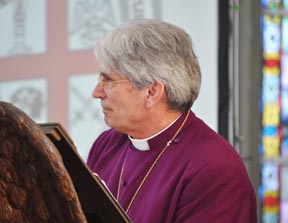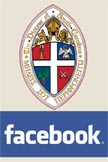Main MenuPopular ResourcesWho's Online NowWe have 68 guests and no members online |
Bishop's MessagesBishop Lawrence's Address to the 222nd Convention of the Diocese of South CarolinaThe following address was given by the Rt. Rev. Mark J. Lawrence, XIV Bishop of South Carolina at the 222nd Annual Convention of the Diocese held at the Francis Marion Center for Performing Arts on Saturday, March 9, 2013. It has been edited slightly for readability. Download a printable version. Bishop’s Address – 222nd Convention of the Diocese of South Carolina “The wind bloweth where it listeth, and thou hearest the voice thereof, but knowest not whence it cometh and wither it goest: so is every one that is born of the Spirit.” John 3:8 (Jesus speaking to Nicodemus.) A young rabbi once asked an older rabbi, “What do you have to do to make God smile?” The wise elder replied, “Just tell Him the plans you have made!” Indeed. Who could have envisioned all that has transpired in the Diocese of South Carolina since our Annual Convention on March 10, 2012 at the Cathedral of St. Luke and St. Paul? Frankly, since last summer’s General Convention of The Episcopal Church there has hardly been a week in which the landscape has not changed in significant and dramatic ways. This week was no exception. On Thursday afternoon I was served a summons to appear in Federal Court as the defendant in a civil suit brought against me by the Rt. Reverend Charles von Rosenberg. You are most likely aware The Episcopal Church has agreed to the state court’s injunction not to use the name of our diocese. Yet now in a self-contradictory move, Bishop von Rosenberg, the Provisional Bishop of the Episcopal Church in South Carolina has used our name, the name of our diocese in bringing a lawsuit against me. I will leave it to our legal counsel to respond to these matters further. It is, however, an opportunity for us to remember that this legal road will take us down many twisting turns. There will be many ups and downs before it is concluded and at times it may test our resolve. We need to remain steadfast in our faith, firm in our conviction and resolute of will as God gives us strength. None of it however should dissuade us from our calling as disciples of Jesus Christ to live in confidence of the good news of his death and resurrection, to continuously put our fingers in the nail prints in his palms; our hands in his side – Do not doubt but believe – to remember his glorious ascension to the right hand of God the Father exalted over all principalities and powers that at the name of Jesus every knee should bow and every tongue confess that Jesus Christ is Lord to the glory of God the Father – remembering his promise to come again in Glory at the close of the age. None of it should detract us from being obedient to Christ’s Great Commission – to Go and make disciples. So undeterred we press on.
Bishop Lawrence Addresses the 221st Diocesan Convention The Rt. Rev. Mark J. Lawrence, XIV Bishop of South Carolina, addresses the 221st Annual Convention of the Diocese of South Carolina, The Cathedral Church of St. Luke and St. Paul, March 10, 2012 The Rt. Rev. Mark J. Lawrence, XIV Bishop of South Carolina, addresses the 221st Annual Convention of the Diocese of South Carolina, The Cathedral Church of St. Luke and St. Paul, March 10, 2012Listen to the audio version of this address. Download a printable copy. (Note the charts referred to in the talk are included in this version. In the version below they are available by link only.) When the LORD restored the fortunes of Zion, Then were we like those who dream. Psalm 126:1 I preached recently at Voorhees College for their Annual Absalom Jones Eucharist. Bishop Andrew Waldo of the Upper Diocese of South Carolina was the celebrant. It was the first occasion in memory that both bishops of South Carolina were present and participating in a worship in St. Philip’s Chapel. I believe it was a positive show of support for this historically black college. As the preacher I wanted to offer a word of hope to these students preparing for life in a world of challenges. While writing the sermon I was stirred by words of the psalmist assigned for this feast day; his remembering the power of a dream—or perhaps more accurately stated, the freedom to dream. Here in the 126th Psalm a faithful petitioner in Israel, after returning from exile to the Promised Land, now finds that he and the people of God are again experiencing misfortune perhaps through drought, threatened crops, or even enemy encroachment. But regardless of the cause, he turns to God in prayer and at once remembers a past deliverance. Memory for him leads not to nostalgia for the past but hope for the future. By remembering the dreams of God he holds on to hope, if only by one thin thread of thanks! And he trusts that God is faithful. Bishop Lawrence's Address to the Clergy, April 14, 2011Bishop Lawrence's Address to the 220th Diocesan ConventionBishop Lawrence's Address the 219th Diocesan ConventionBishop Lawrence's Address to the 218th ConventionThe Lenten Fast: A Lenten Message from Bishop LawrenceThe Lenten Fast: Feasting on God If you lookup fast or fasting in a Bible concordance you’ll find many of the major characters in Holy Scripture from Moses to St. Paul practiced fasting as a spiritual discipline. Jesus—while not specifically commanding his disciples to fast—clearly assumed that they would. It is there not only in his Sermon on the Mount, “When you fast do not be like the hypocrites….” (Matthew 6:16-18) but, also, in his response to the criticism of the Pharisees. (Luke 5:35) More illustrative still is his forty-day fast in the desert of Judah. Down through the Christian centuries sinners and saints, Puritans and Popes, even modern Christian leaders from Billy Graham to Mother Teresa fasted at various times and for different purposes. Our current Prayer Book, as well as the 1928 Book of Common Prayer, lists Ash Wednesday and Good Friday as days of fasting. For that matter all of Lent is set aside in the Church Year as a season for self-denial and abstinence. While it may seem like a severe practice in an age of indulgence, more than a few Christians have found the seasonal custom of fasting for the specific purpose of drawing nearer to God, or for bringing about a spiritual break-through, profoundly beneficial. What is fasting? It is abstaining from food or certain foods or drinks that appeal to us for a specific time period. This is not practiced primarily for dietary or nutritional goals, but for spiritual purpose. There are different ways to fast. For instance Abstinence is abstaining from certain foods for a day or a season, such as giving up coffee, sweets, meat, or wine for Lent. Many Episcopalians practice this sorting of fasting during the Lenten season, beginning the discipline on Ash Wednesday and breaking it on Easter Day. Another form of fasting is a partial fast. This is drinking only fruit or vegetable juices for a day or longer. A normal fast is eating no food but drinking water. This can be from dinner to dinner, (a 24 hour period), or from dinner one night to breakfast the morning after the fast day, (a 36 hour stretch). Sometimes this sort of fast is practiced for three days or longer. For obvious reasons this last type of fasting depends upon a person’s health, age, medical condition or profession. For instance I would prefer not to be operated on by a surgeon who was in the middle of such a three-day fast. In my experience the mind doesn’t function quite so well until after the extended fast is broken. Then it seems keenly alert. Jesus’ teaching in the Sermon on the Mount applies to all these various types of fasting. He counsels secrecy because he is concerned with our motive. Our purpose needs to be first and foremost to draw nearer to God—to deepen our spiritual life or discern his will, especially in mission (Acts 13:2-3). There are of course many secondary purposes for fasting. It can help jump-start one’s walk with God, especially if we have fallen on dull or slothful times. It can bring a break-through in a relationship, make us more attuned to the leading of the Holy Spirit, give us greater clarity about the future, or aid us in breaking some spiritual bondage or habit. Many find it helpful in humbling themselves before God by revealing what is in them, or just hunger-deep below the surface—things lurk there like anger, bitterness, and impatience, inordinate love of pleasure or daily comfort. More important still is how it brings balance to our lives nurturing temperance, self-control, and freedom—reminding us that most of the time we should be eating to live, not living to eat. This however needs to be said, and it can hardly be stated too strongly. The point of the Lenten fast is not primarily for gaining self-discipline, clearing spiritual cobwebs, or even obtaining spiritual victories, as wonderful as each of these may be. It is to detach ourselves from finding comfort in food so we may feast on the living God. Drinking deep draughts of the Holy Spirit—the living water. Nourishing ourselves on Christ and his Word, this is the bread of life. You may find it is a joyous thing to make these small sacrifices of food or drink for your Lord, knowing that he rewards those who earnestly seek him. And this is the greatest reward: to experience his presence and good pleasure abiding with you, as you abide with him. |
Latest News
St. Paul's, Conway, Suffers Fire Damage
Please keep our brothers and sisters at St. Paul's, Conway, in your prayers. A fire broke out in the attic of their administration building at 11 a. [ ... ] latest news+ Full Story
Advent, Christmas and Epiphany Events around the D...
If your church has Advent, Christmas or Epiphany events (other than those held during regular Sunday morning, or Christmas Eve service times) email us [ ... ] latest news+ Full Story
Other Articles
|

